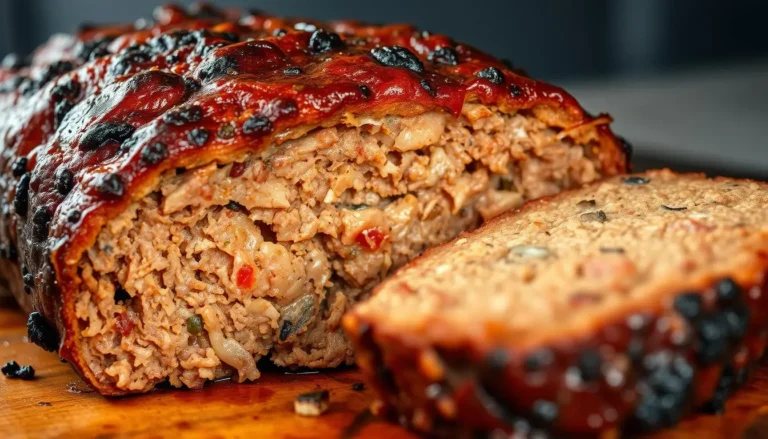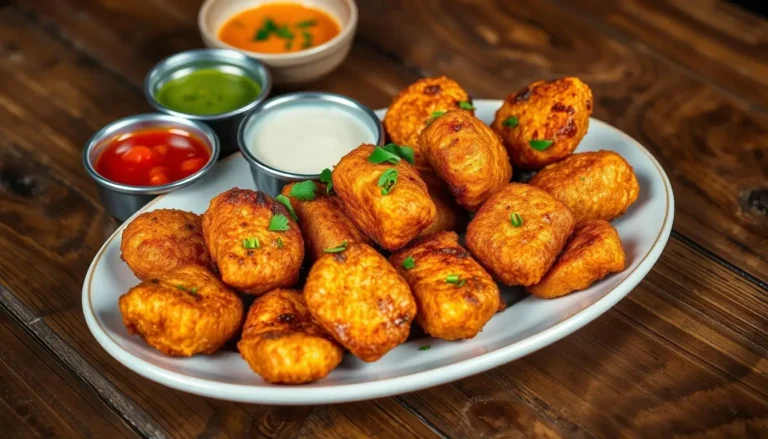The Best Healthy Moroccan Recipe – Quick And Nutritious Dishes
I’m excited to share my favorite healthy Moroccan recipe with you. It’s a traditional dish that’s both delicious and nutritious. Moroccan cuisine is famous for its rich flavors and aromas. It offers many healthy dishes, like chicken tagine.

This chicken tagine recipe is quick and easy to make. It takes 20 minutes to prepare and 40 minutes to cook. It serves 6 people and has about 410 calories per serving. It’s also packed with 26 grams of protein, making it a great healthy meal option.
Key Takeaways
- Moroccan cuisine offers a wide range of healthy and nutritious dishes, including traditional Moroccan dishes like chicken tagine.
- A healthy Moroccan recipe like chicken tagine can be made with simple ingredients like chicken, onions, garlic, lemon, and olives.
- The dish is seasoned with bold spices like paprika, cumin, and cayenne pepper, which add to its rich flavors and aromas.
- The recipe has a prep time of 20 minutes and a cook time of 40 minutes, making it quick and easy to make.
- The dish serves 6 people and has approximately 410 calories per serving, making it a great option for a healthy meal.
- Moroccan cuisine is a great way to add some excitement to your meal routine, with its rich flavors and aromas, and healthy Moroccan recipes like chicken tagine.
Understanding the Magic of Moroccan Cuisine
Moroccan cuisine is rich and full of culture. It’s not just about food; it’s about the experience and the people. Moroccan dishes mix Arab, Berber, Mediterranean, Andalusian, and southern European flavors.
Key ingredients like lamb, couscous, and spices make Moroccan food special. These ingredients help create tasty and healthy dishes. Moroccan cooking offers both traditional and modern recipes for everyone.
Some popular Moroccan dishes include:
- Tagine: a slow-cooked stew made with meat, vegetables, and dried fruits
- Couscous: a traditional North African dish made from steamed semolina flour
- Chakchouka: a spicy vegetable stew made with tomatoes, peppers, and onions

These dishes are not only tasty but also nutritious. They use fresh ingredients and spices. Moroccan cuisine lets you experience the magic of authentic cooking and enjoy easy recipes.
| Dish | Ingredients | Cooking Time |
|---|---|---|
| Tagine | Lamb, vegetables, dried fruits | 2-3 hours |
| Couscous | Steamed semolina flour | 30 minutes |
| Chakchouka | Tomatoes, peppers, onions | 20-30 minutes |
Essential Ingredients for Healthy Moroccan Cooking
Healthy north african food starts with the right ingredients. Moroccan dishes are famous for their bold tastes and smells. This comes from mixing spices, herbs, and other key items. Chickpeas, full of protein and fiber, are a big part of Moroccan cooking.
Important ingredients include olive oil, garlic, ginger, cumin, turmeric, and garam masala. They add flavor and health benefits. For instance, olive oil is full of antioxidants. Garlic and ginger help fight inflammation.
Here are some key ingredients and their uses in Moroccan cooking:
- Chickpeas: used in dishes like hummus, stews, and salads
- Olive oil: used for cooking, dressing salads, and making sauces
- Garlic and ginger: used to add flavor to dishes like tagines and stews
- Cumin, turmeric, and garam masala: used to add warmth and depth to dishes
Using these ingredients in your Moroccan cooking makes delicious, healthy meals. Whether it’s a hearty tagine or a fresh salad, quality ingredients and balanced flavors are key. This way, you can make a truly flavorful moroccan dish.
| Ingredient | Health Benefits | Uses in Moroccan Cooking |
|---|---|---|
| Chickpeas | Rich in protein and fiber | Hummus, stews, salads |
| Olive oil | Rich in antioxidants | Cooking, dressing salads, making sauces |
| Garlic and ginger | Anti-inflammatory properties | Adding flavor to tagines and stews |
My Favorite Healthy Moroccan Recipe: Vegetable Tagine
I’m excited to share my favorite healthy Moroccan recipe, Vegetable Tagine. It’s perfect for a weeknight dinner or meal prep. The dish uses butternut squash, eggplant, and cauliflower, all full of nutrients and fiber.
The secret to this recipe is the aromatic spices. Cumin, coriander, and cinnamon add depth and warmth without extra calories. I also add dried fruits like apricots or figs for natural sweetness.
Key Ingredients and Their Health Benefits
Some key ingredients include:
- Butternut squash, high in vitamin A and fiber
- Eggplant, rich in antioxidants and potassium
- Cauliflower, low in calories and high in vitamin C
- Chickpeas, a good source of protein and fiber
Step-by-Step Cooking Instructions
To make this recipe, start by sautéing onions and garlic. Then add spices and cook for a few minutes. Next, add the vegetables and chickpeas, cooking until tender.
Season with salt and pepper to taste. Serve over quinoa or couscous.
The Health Benefits of Moroccan Spices
Exploring authentic moroccan cooking, I find the health perks of its spices fascinating. Moroccan dishes are known for their bold tastes and smells. This is thanks to spices like cumin, turmeric, and cinnamon. These spices not only enhance flavors but also have anti-inflammatory and antioxidant effects, boosting our health.
Cumin aids digestion and fights infections. Turmeric has anti-fungal and anti-microbial properties. Ginger is packed with manganese and fights inflammation. These spices are mixed with chickpeas and couscous to make dishes that are both tasty and nutritious.
A typical moroccan meal starts with a vegetable salad. This shows the diet’s focus on vegetables. Moroccan dishes often include potatoes, tomatoes, peppers, artichokes, and carrots. These veggies are full of nutrients and fiber. Dried fruits like dates, raisins, and apricots add sweetness without refined sugars.
Using these spices and ingredients in cooking offers many health benefits. They can reduce inflammation, improve digestion, and increase antioxidants. By adding these to our meals, we can enjoy the health benefits of moroccan cooking and savor its rich flavors.
| Spice | Health Benefits |
|---|---|
| Cumin | Aids digestion, acts as an antiseptic, rich in iron |
| Turmeric | Anti-fungal and anti-microbial properties, anti-inflammatory |
| Ginger | Provides dietary manganese, anti-inflammatory properties |
Mastering Traditional Moroccan Cooking Techniques
To make a nutritious Moroccan meal, knowing traditional cooking methods is key. The tagine, a clay pot with a conical lid, is a symbol of Moroccan cooking. It steams food, making it tender and full of flavor.
The tagine is great for many dishes, from stews to braises. Learning to use it well is crucial. It helps keep nutrients and flavors in the food.
Understanding the Tagine
The tagine cooks food evenly, thanks to its design. This slow cooking is vital for a healthy, tasty Moroccan meal.
Steam and Slow-Cooking Methods
Steam and slow cooking are core to Moroccan cooking. Using a tagine or similar vessel makes many recipes both tasty and healthy.
Modern Appliance Alternatives
While traditional methods use clay pots, modern appliances can also make great Moroccan meals. Slow cookers and pressure cookers are good choices for easy Moroccan recipes.
Quick and Easy Moroccan Breakfast Ideas
Starting your day with a healthy meal is key. A healthy Moroccan recipe can be just what you need. My favorite breakfast is a Spiced Chickpea Bowl, ready in no time. It’s not only tasty but also full of protein and fiber.
To make this dish, you’ll need chickpeas, spinach, and eggs with some Moroccan spices. Just sauté the chickpeas and spinach, then add the eggs. Cook until the eggs are done. Serve it in a bowl and enjoy! Adding crusty bread or sourdough on the side makes it even better.
Here are some other quick and easy Moroccan breakfast ideas:
- Shakshuka with eggs and Moroccan spices
- Avocado toast with Moroccan chili flakes
- Yogurt parfait with granola and Moroccan honey
Adding Moroccan spices to your scrambled eggs or omelette can make it healthy. You can also try a Moroccan-style breakfast skillet with eggs, veggies, and whole grains. The trick is to try different flavors and ingredients to find what you like.
| Breakfast Idea | Prep Time | Cook Time | Total Time |
|---|---|---|---|
| Spiced Chickpea Bowl | 5 minutes | 10 minutes | 15 minutes |
| Shakshuka | 10 minutes | 15 minutes | 25 minutes |
| Avocado Toast | 5 minutes | 2 minutes | 7 minutes |
Meal Prep Tips for Moroccan Dishes
Preparing easy Moroccan recipes ahead of time can save you a lot of time. Many dishes, like Moroccan Chicken Bowls, can be made in under an hour. They can then be stored in the fridge for up to 4 days.
Start by planning what dishes you want to make. Make a list of what you need to buy and set aside time for cooking and storing. Tagines, stews, and salads are great for meal prep. They can be cooked in bulk and then portioned out for easy reheating.
Storage Guidelines
Proper storage is key for meal prep. Here are some tips:
- Store cooked dishes in airtight containers in the fridge or freezer.
- Label and date each container so you know what you have and how long it’s been stored.
- Keep raw ingredients separate from cooked dishes to prevent cross-contamination.
Make-Ahead Components
Preparing individual components of a dish ahead of time is another great strategy. Cook quinoa or couscous and store it in the fridge for up to 3 days. Roast vegetables like sweet potatoes and cauliflower and store them in the fridge for up to 5 days.
Weekly Meal Planning Strategies
Having a weekly meal plan is crucial for successful meal prep. Here are some tips:
| Day | Breakfast | Lunch | Dinner |
|---|---|---|---|
| Monday | Moroccan oatmeal | Chicken tagine | Grilled chicken and vegetables |
| Tuesday | Avocado toast | Quinoa salad | Beef and vegetable stew |
| Wednesday | Smoothie bowl | Grilled chicken and quinoa | Baked salmon and sweet potatoes |
By following these tips and adding easy Moroccan recipes to your diet, you can enjoy healthy and delicious North African food all week long.
Common Mistakes to Avoid in Moroccan Cooking
Authentic Moroccan cooking has its own set of common mistakes. These can affect the flavor and quality of your dish. To make a delicious Moroccan meal, avoid using low-quality spices, overcooking, and not using traditional cooking methods.
Some common errors include not using fresh ingredients. This can make your dish taste bland and lack texture. Also, overcooking can reduce nutrients and make your dish look unappealing. To avoid these, it’s key to follow traditional Moroccan recipes and use high-quality spices and ingredients.
Here are some tips to help you avoid common mistakes in Moroccan cooking:
- Use fresh and high-quality ingredients, such as olive oil, spices, and herbs, to create an authentic Moroccan flavor profile.
- Avoid overcooking, as it can result in a loss of nutrients and a less appealing presentation.
- Follow traditional Moroccan recipes and cooking techniques, such as slow-cooking and steaming, to create a delicious and authentic Moroccan dish.
By following these tips and avoiding common mistakes, you can make a delicious and authentic Moroccan meal. Whether it’s a hearty tagine or flavorful couscous, success comes from using quality ingredients and traditional cooking methods.
- Tagine: a slow-cooked stew made with meat, vegetables, and dried fruits.
- Couscous: a traditional North African dish made with steamed semolina flour, often served with vegetables, meat, and spices.
- Harira: a hearty soup made with lentils, chickpeas, and tomatoes, often served as a starter or snack.
| Dish | Ingredients | Cooking Time |
|---|---|---|
| Tagine | Meat, vegetables, dried fruits | 1-2 hours |
| Couscous | Semolina flour, vegetables, meat, spices | 30-40 minutes |
| Harira | Lentils, chickpeas, tomatoes | 30-40 minutes |
Conclusion: Embracing the Healthy Moroccan Lifestyle
Exploring Moroccan cuisine shows us the benefits of a healthy lifestyle. By using healthy moroccan recipes and mediterranean diet recipes, you can enjoy fresh ingredients and traditional cooking. This unlocks the power of healthy eating.
Moroccan dishes are filled with aromatic spices and slow-cooked to keep nutrients in. This approach to cooking is rooted in tradition. It helps you nourish your body and mind, improving your health and well-being.
Enjoying a fragrant vegetable tagine or a refreshing Moroccan mint tea is key. It’s about savoring the moment and connecting with the rich cultural heritage. Embracing the Moroccan lifestyle means enjoying nutritious meals and appreciating mindful living.



